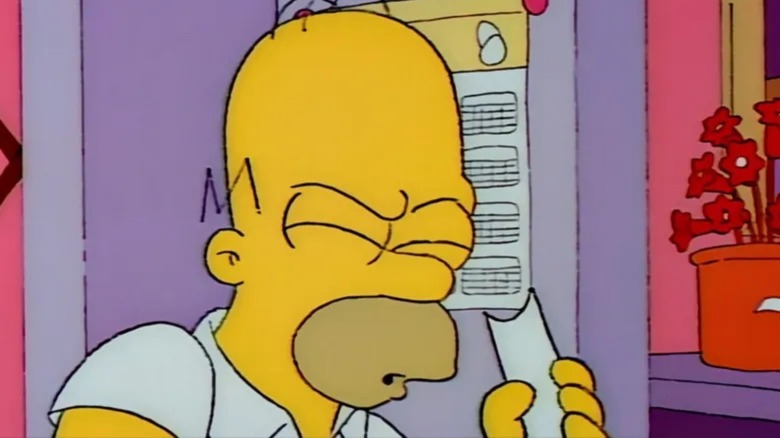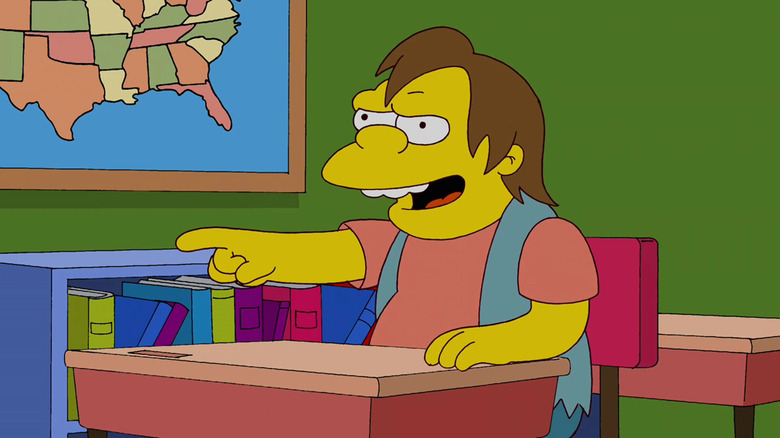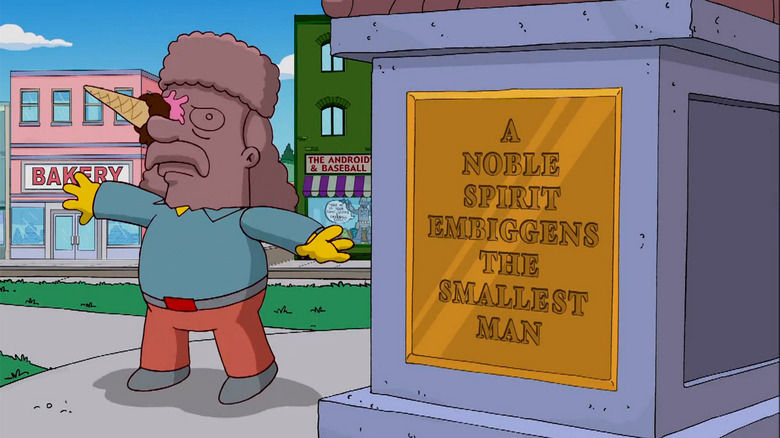Only One Of The Simpsons' Famous Catchphrases Was Actually Created By The Show
Matt Groening's animated series "The Simpsons" hasn't been good since season [fill in the blank].
That seems to be a common discussion within "Simpsons" circles, anyway. There seems to be a general, unrecorded consensus that the glory days of "The Simpsons" are behind it, and that the show has been spinning its wheels since those glory days. There is no consensus, however, when those glory days were exactly. Some older "Simpsons" fans feel that the series peaked somewhere around season five or six. Other, younger viewers feel that the show was just fine up until the release of "The Simpsons Movie" in 2007. Just like "Saturday Night Live," however, the present always seems to be the worst time for the show.
The fact of the matter is that "The Simpsons" has been running consistently since 1989, having made 768 episodes over 35 seasons. It is a cultural presence that once spearheaded the very tone of all popular culture, and now, even years later, consistently turns out intelligent, surreal animation with huge laughs, memorable characters, and an unusually salient Gen-Xer's cynical point of view.
We should also appreciate how much of "The Simpsons" has leaked its way into the common vernacular. Homer Simpson's annoyed grunt is now in the Oxford English Dictionary (under "doh"), and terms like "cromulent," "yoink," "dollary-doo," "Boo-urns" are used frequently in common conversation. What's more, popular catchphrases like "Ay caramba," "don't have a cow," and "cowabunga" were made further popular by their usage on "The Simpsons."
In the history book "Springfield Confidential" by Mike Reiss and Mathew Klickstein, the authors pointed out that, of all the catchphrases on the series, only one was ever scripted specifically for the show: the "haw-haw" laugh from Nelson Muntz (Nancy Cartwright). The rest were either preexisting references or actor's improvising.
[Annoyed grunt]
Reiss pointed out that the catchphrases used by Bart Simpson (Cartwright) all came from preexisting sources. "Cowabunga," was already in use in surfer culture, and '80s kinds likely heard it from the Teenage Mutant Ninja Turtles. The writers of "The Simpsons" recalled the word being used by Chief Thunderthud, a (sadly stereotyped) First Nation character from "The Howdy Doody Show." Meanwhile, the interjection "¡Ay, caramba!" has been in common use since the 1780s, originally associated with María Antonia Vallejo Fernández, aka La Caramba, a famed Flamenco dancer and singer from Madrid who used it in her act. "Don't have a cow," meanwhile, entered the popular American lexicon sometime in the 1950s, and was revived in the 1980s via "valley girl" culture.
Homer's "D'oh" was improvised by actor Dan Castellaneta, and he has gone on record saying it was a shortened version of an interjection yelled by actor Jimmy Finlayson in old Laurel & Hardy shorts. In the script, it was written merely as [annoyed grunt].
Reiss pointed out that only Nelson Muntz's mocking "haw haw" was actually written into a script as "haw haw." In the episode "The War of the Simpsons" (May 2, 1991), written by Jason Swartzwelder, Grampa Simpson (Castellaneta) removed his belt, threatening to whip a misbehaving Nelson with it. When Grampa's pants fell down, Nelson laughed derisively. It was Cartwright who, according to Reiss, gave Nelson's laugh it's musical cadence, specifically E#, C#. Cartwright performed it that way at the episode's original table read (a "dry run" of a completed script), and the writers all loved what she did. "Haw haw" is now used popularly as an expression of unrepentant schadenfreude.
A noble spirit embiggens the smallest man
"The Simpsons" can also be credited for the invention of the words "embiggen" and "cromulent." In the episode "Lisa the Iconoclast" (February 18, 1996), written by Jonathan Collier and punched up by future "Futurama" co-creator David X. Cohen, the slogan of Springfield, the Simpsons' hometown, is finally looked at up close. It seems the town's founder, a Davy Crockett-like figure named Jebediah Springfield, once said "A noble spirit embiggens the smallest man." Of course, "embiggens" isn't a word, revealing that the city of Springfield is, at its very core, kind of dumb. "Enlarges" is a word, but not "embiggen."
Mrs. Krabappel (Marcia Wallace) comments that she had never heard the word "embiggen" before she had moved to Springfield. Ms. Hoover (Maggie Roswell) comments that "embiggen" is "a perfectly cromulent word." Cromulent was invented for the script as a word meant to evoke "acceptable" as a definition, but a word that still felt a little bit like nonsense. Cohen invented the word.
It has since made its way into dictionaries. Cromulent, we now find, is a perfectly cromulent word. In "Springfield Confidential," Reiss also pointed out that "D'oh!" was included in the Oxford English Dictionary, but the author expressed frustration that it was misspelled without its apostrophe. As it appeared in the OED, Homer's grunt is indistinguishable from Play-Doh.
As of this writing, one can also but t-shirts with the term "steamed hams" printed on them, although no major fast food chains have begun offering "steamed hams" on their menus. But don't worry. It's only a matter of time.


